#because they are both so used to defining themselves in the context of another person
Text
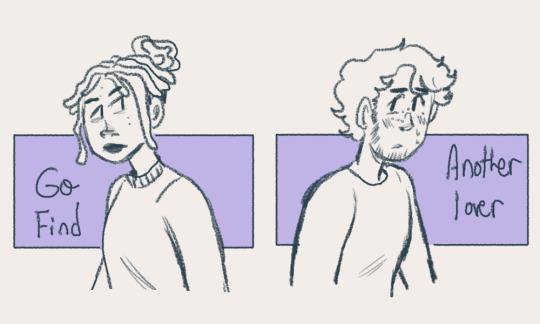
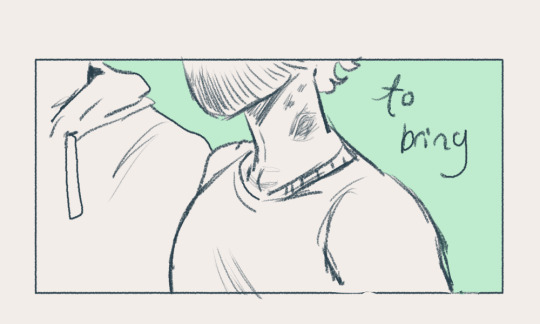
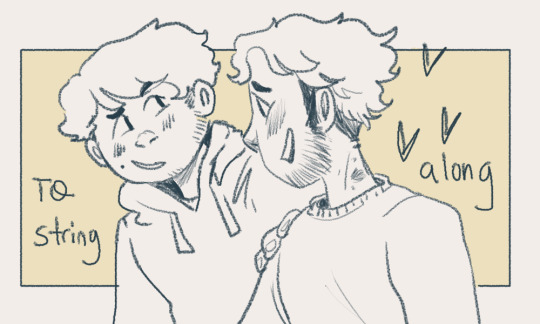
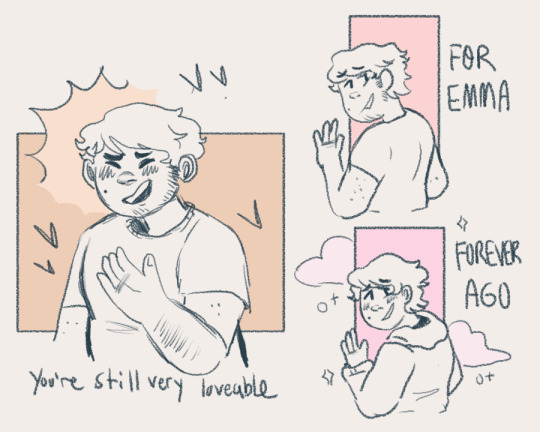
for emma - bon iver
cw: bruises, implied s/exual content
grant and terry jr. as high school sweethearts + (eventually) friendly exes is Everything to me. also grant and lark friends to ill-advised fwbs to lovers <3
anyway i just have been very compelled by the idea of terry jr. really struggling to move on at first, because he just strikes me as a bit of a hopeless romantic and also grant would have been his first serious relationship and (arguably more important) his best friend from ages 13-18
also have a lil thing in the works for grant's POV of the breakup >:3c stay tuned >:3cc
#dndads#digital sketch#digital art#dndads fanart#grant wilson#grant x terry jr.#grant x lark#lark oak#lark oak garcia#terry jr. stampler#terry jr stampler#kiddads#art tag#this is technically part of the terrow college AU cinematic universe but also none of my dndads art is super coherent as far as AUs#BUT my thoughts for terry and sparrow involve them being able to confide in + support each other#because they are both so used to defining themselves in the context of another person
105 notes
·
View notes
Text
Stede Bonnet's Stories (S1)
My favorite theme (right now) in OFMD is storytelling, and how the characters' stories shape the narrative and one another. In OFMD, stories are how people connect to one another. How they figure out their place in the world around them, how they form communities, how they grow and change. Because stories are also how the characters come to understand themselves.
In the first season, Stede is the loudest and most determined storyteller of them all. He's literally paying someone to follow him around and write his story; he's built the entire ship and outfitted it to create a certain story; he's wearing mad, impractical clothes in a harsh climate to express his personality.
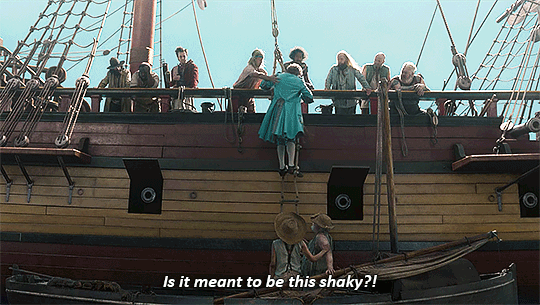
On the one hand, this is a dumb thing to do. The crew can't read the library he's provided for them; his clothes (and incompetence) make his first "raid" a disaster; the pirates are plotting mutiny very quickly indeed. And his attempts to "toughen up" wind up nearly burying the crew in a larger, imperial story of race and class.
On the other hand, it's an immensely brave thing to do. Stede doesn't really try to be "like Blackbeard." He doesn't disguise his accent, wear ugly clothes, or make an example of someone on the crew to show his "iron fist." He is trying to do something genuinely different. To be a gentleman and a pirate. To tell a story that hasn't been told before. And to create space for others to tell a story: when Wee John voices criticism, Stede hands over his own fabrics to the crew and encourages them to "express yourselves." Between the bedtime stories and Stede's lie about Nigel (which is revealed very quickly afterwards), the crew decide they'll try telling his "new" story with him.
At first, the weakness in Stede's story seems to be that he's telling it in the wrong place. That his fiction is too far from reality, which is going to crush his story (as so many stories have been crushed throughout history).
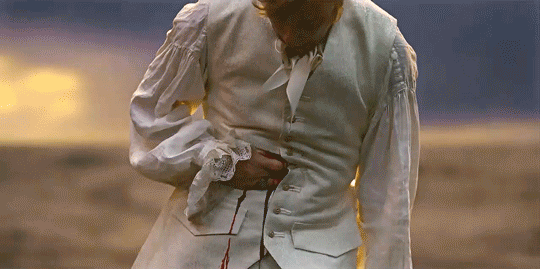
And that is a problem, and his misjudgments wind up with him being betrayed by pirates and almost executed by Spanish naval officers. But it's a solvable problem, with help.
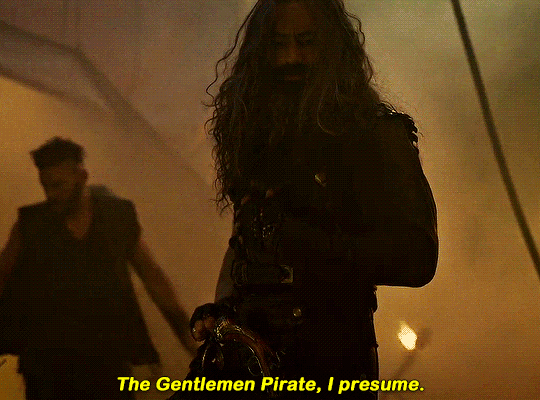
From the moment they meet, Ed and Stede are at their best when they tell stories together. When they work together, they figure stuff out about themselves, they connect with one another and with the crew, and they find a way to write the third story in a world that tells them they have only two options (gentleman or pirate). They make ship into a lighthouse; they bring a kraken to life and finally beginning to understand it; Stede uses his ship's mast and Ed's trick to outwit Izzy; a treasure map yields actual 'treasure'; the ship is invaded by the English, but everyone emerges safe and alive.
But it doesn't last. Because the real weakness of Stede's storytelling isn't the context. It's that Stede doesn't believe it himself.
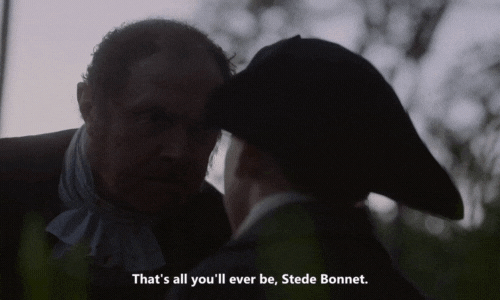
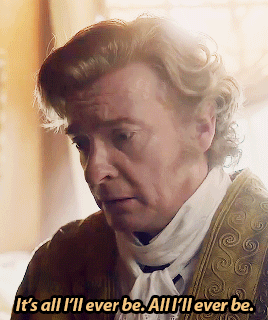
Stede is doing all this to try to be both a boy worthy of respect from his father, and a boy who picks flowers. He's still defining himself by the terms of the world he came from. By running away, not running towards something.
So, when Chauncey confronts him with his own "monstrousness," Stede believes him. It's all his insecurities come to life. And he believes Chauncey when he says Stede's "brought history's greatest pirate to ruin."
If all Stede will ever be is a "little rich boy," then he needs to stop trying to be something else. Because telling that story means hurting others.
Stede's wrong. Telling a story, even when you don't fully believe it, changes you and the people who listened to your story. And when Stede gives up on his storytelling, the causes and effects circle round: Stede told stories. As a result, other people told stories. And even if Stede stops telling stories, or tries to tell different stories, other people won't.
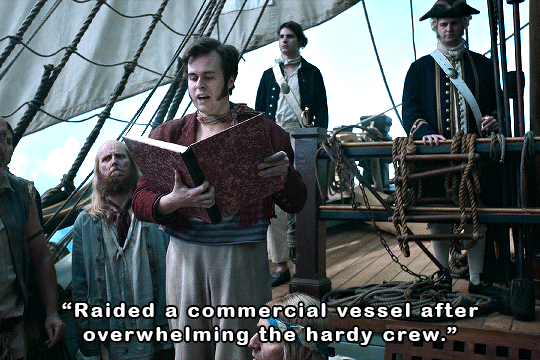
Stede lied when he confessed to Nigel's murder. Said he deserved to die for leaving his wife and family. But he doesn't die there, because Ed tells his own story about grace, and the crew takes Stede's mad stories as their own.

And because of what Stede did, Mary Bonnet was able to tell her own story, fully and on her own terms. And to believe in it completely. Ed and the crew were able to tell their stories, too--which comes near to an actual transformation.
In the end, it doesn't matter that Stede didn't believe his story. He changed anyway. He created space for other people to change, to tell stories that unraveled his own lies, that saved him from himself. And he awkwardly, finally, figured out what story he wanted to tell. His own truest story.
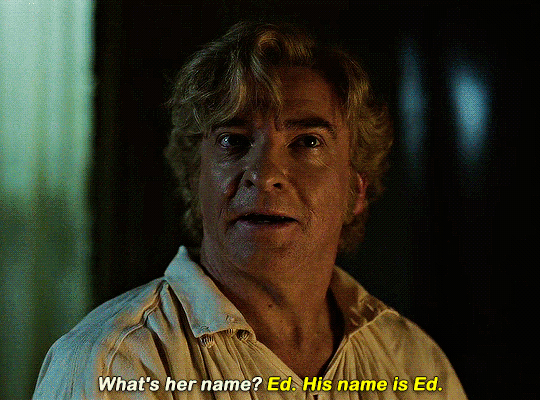
And to escape the truth he's accidentally been trapped in, Stede tells a story that inverts what he did before. At the beginning of the season, Stede was telling a story that no one believed. That only he even really tried to believe. But in the finale, he stages an elaborate fuckery to tell a story that everyone believes--except him, and the people who matter. Truth materializes from the fiction.


Stede's stories set so many people free. And in the end, when he's brave enough to lie his way to the truth, Stede's stories set him free, too.
#ofmd#our flag means death#ofmd s2#ofmd s2 spoilers#ofmd spoilers#ofmd meta#stede bonnet#blackbonnet#legit i could go on about this for agggges#just about every ep has a storytelling moment or 4#there's all these nuanced ways the stories affect the plot and each other its so complicated and i love it
94 notes
·
View notes
Text
Hypnotic Visuals #1: Ocean Waves
If you'd like, this post is accompanied with a backing track of waves to help better understand and feel the points being made. It is not necessary, though.
...
When it comes to the choice of hypnotic visuals, some consideration should be made towards each one's specifics.
Hypnosis can be a tricky thing in many aspects, but one large reason is just how context-dependent it is. Each person's mind is its own individual landscape of biases and perceptions and strengths and weaknesses, and each one might have a different effect on how one receives trance. However, this variation is also extended outwards, towards the choice of visuals themselves.
Each visual, of which there are essentially infinite, comes with their own common aesthetic associations, so I'd like to make a series talking about various hypnotic visuals and how you can tailor your sessions around them most effectively. Let's start with one of the simplest, and a classic: the ocean and its waves.
The first thing about the ocean is a very important lesson about pre-talk. If you do not get to know your subject and use this visual, there is a chance they have thalassaphobia or some trauma regarding the sea, and have a violent abreaction. Talking with your subject is important for hundreds of reasons, but one is avoiding exactly this. Even a mention of the word "ocean" in an extra vulnerable state like trance could be a complete shock to the system that disrupts trances with you and your subject in the future. Even if unintentional, it's a betrayal of trust and the mind can be slow to mend that.
As for those who do not fear the ocean, they likely find it the opposite, quite relaxing. Relaxation, while not strictly necessary for trance, is almost always a part of it because relaxation frees up perceptive "room", so to speak. You only have so much focus and the mind normally spreads it out to everything around you. Relaxation takes the focus away from everything else, and allows that focus to be pinpointed on me and my words. Some visuals deal with a more active focus, this takes the opposite path.
As such, you want to also pepper in suggestions to focus in on your voice, either through another visual, or just direct "Focus" commands or suggestions.
If you don't take advantage of the relaxation, there's wasted potency just washing away in the waves.
The ocean is something interlinked with the most steady functions of our entire planet. As steadily as the sun rising in the sky, so too does the moon, and with every moment it exists, our tides continue in a steady motion.
Rhythm is very natural to both us and the tides. If one spends long enough near the ocean, they might find their mind get accustomed to that steady rhythm.
The tides going,
Back, and Forth,
Back, and Forth,
This rhythm is useful for trance. When you define one quality of the visual you're using, something natural to that visual, you've essentially defined a plot device. This is the thing you attach suggestions to.
Going back, and forth,
and back, and forth,
This rhythm of the tides has multiple routes one could take. My personal favorite is the kinetic angle. That's to say, the motion of it.
Rocking back,
and forth,
and back,
and forth,
We have a tendency to make unconscious movements when thinking about things. It's so natural to us that it's one of the easiest things to be suggested to someone. It's a way to assert some subtle control immediately. Rocking is also an especially calming motion, in combination with the ocean visual itself.
Back,
and forth,
and back,
and forth,
can even start to serve the form of a mantra.
Mantras serve multiple purposes, but the most useful practically is to fill up the empty space in the subject's mind when you're not actively suggesting them. Relaxation can easily be paired with suggestions of dulling thoughts, and this is a way to start heading in that direction.
Water in itself is a visual, and can also be applied here. Whether it's the water consuming you, submerging you, or filling you, that unmistakable sound of being submerged in water has a very visceral sensory effect on people. You can point out the specifics, of that slight pressure on the skin, of requiring so much more effort to move, of everything being duller and even needing to close your eyes.
When combining dulling visuals with suggestions of your voice being the only thing perfectly clear, you can amplify the strength of your words on both ends.
When you have multiple plot devices, say, the swaying of the tides and being submerged in water, you can intertwine the two and amplify both, as well. When you're submerged in water, you're at the mercy of the tides, being pulled in looong, drawn out motions, tapping into a lack of control. I can tell you that my voice is an anchor, the only thing keeping you steady, that you need to hold on.
Every little detail is another plot point in the narrative, and each one is much more effective than plainly stating what thing you want the person to feel. Stories draw us in, immerse us, and this is not something that should be ignored. These were only a few examples of what you can do, as with the amount of visuals, the amount of qualities and routes to take with each are also wide and varied.
If you want to really give your subjects an unforgettable experience, you need to learn how to weave a story. Visuals are the key.
If anyone has any specific visual they want given extra detail and options for, feel free to ask.
That all being said, I hope you enjoyed reading, and happy hypnotizing.
#owlette#hypnosis#hypno advice#hypnosis advice#hypnoposting#hypnokink#hypnok1nk#hypnosub#hypno fantasy#hypno sub#hypnotized#text hypnosis#hypnotic#hypnosis script#creative writing
39 notes
·
View notes
Note
this is probably a very dumb question so im sorry in advance: but for praying to the Gods, is making khernip & the barley stuff absolutely necessary? is it vital? istg ill do more research but right now im just very confused haha
Here's the interesting thing: khernips and its use in modern Hellenic Polytheism isn't entirely "correct" (I don't like using this term in this context but I cannot for the life of me think of a better term atm).
Fel the Blithe explains this very well in their Purification & Cleanliness video, but I'll give the general gist here.
Khernips/lustral water was indeed a thing, just not how we view it. We tend to think of it as either burning something and extinguishing it in clean water while saying a prayer, or alternatively gathering sea water or making salt ("sea") water by adding salt to clean water. But the reality is that historians and archaeologists can't come to an agreement due to insufficient evidence as to what this water was for absolute certainty.
One source talks about khernips as we know it but even then the passage itself is iffy. Greek Religion by Walter Burkhert is viewed as a generally good source by most in the helpol community. I haven't fully read it yet so I cannot give my own opinion on it. But, here is what he had to say about lustral water:
"There is no consecration of the water, but often it must be drawn from a particular source... Occasionally, the water must be fetched from further afield, from an ever-flowing spring or from the always powerful sea... The purifying power of fire is joined to the power of water when a log is taken from the altar fire dipped in water and used to sprinkle the sanctuary, altar and participants."
Is this universal? Is this just from one city or temple? Was this the norm or only for a specific ritual or festival? Who knows!
So, what does this mean today? This doesn't negate khernips as we know it as invalid. After all, it is technically historical. However, we can't say for certain that it was the common person's method of cleansing before prayer, ritual, offering, etc. all across Ancient Greece.
Another method of cleansing one's self via water is spring water or water from a flowing river. In Ancient Greece, it was expected of one to cleanse, pray, and give an offering to the god presiding over the river that the person is about to cross. And they cleansed themselves with the water from the river.
Keep in mind that times were different. The concept of clean water was very different to us now. In today's time, clean water is a given and typically easily accessible (there are, of course, exceptions, but in comparison to hundreds of years ago, it's safe to make this general statement).
All of this to say, taking a shower, washing your hands in tap water, or splashing your face with it can be and is just as cleansing as khernips/lustral water because technically it is lustral water. If we're defining lustral water as clean water, then yeah, tap water from the sink or filtered water from a water dispenser is absolutely lustral and therefore spiritually cleansing!
But as for its use, cleansing yourself is typically a requirement before approaching the gods. Of course, there are exceptions, both modern and historical. There are plenty of mythos that show someone in desperate times praying without doing the proper ritual of the time (cleansing, offering, etc.). But overall, it is considered vital to be clean before the gods.
However, I don't really know what you're referring to when you say "barley stuff". Are you talking about Zeos Ktesios and the corresponding vase/container?
TLDR: "is making khernips absolutely neccessary?" is kind of two questions: is khernips itself necessary and is making a cleansing water to cleanse with before approaching the gods necessary. No to the first, yes to the second. But "making" a cleansing water is as easy as collecting tap water or filtered water. Whenever I'm about to approach the gods, I cleanse my hands with water (just water usually) before putting some of the water on my face as well. Hope this helped, anon!
#ask#anon#helpol#hellenic polytheism#hellenic polytheist#hellenic paganism#pagan#paganblr#witch#witchcraft#magic#witchblr#khernips#lustral water
62 notes
·
View notes
Text
5 Man Band
It is not a controversial statement to say that the backyard kids fit the 5 man band archetype. They're even color coded!
Phineas - Leader
He's the one who comes up with the gangs activities for the day. And when world saving gets involved, he's the one who directs conversation around plans: (see Klimpaloon Ultimatum's Buford Van Stomm scene, CATU's cut Step into the Great Unknown, and in NOTLP).
Ferb - Lancer
The foil to the leader. While often times the leader may act as an opposing force to the leader this is not necessary. Ferb acts as a foil in other ways. The quiet man of action to Phineas's loud enthusiasm. Ferb is also the more likely of the two to break the rules or mess with people while Phineas is overwhelmingly sincere. He gets Phineas's plans to work and often subtly provides input.
Isabella - Heart/Chick
Isabella is the girl. Unfortunately, that's what this role boils down to historically (2007). The girl who does girl things, like make-up or being flirty or whatever in the infiniteness of femininity is relevant to the character and context. In the context of girl only groups, this role is generally the girly-girl; the pretty or cute one. In the context of Phineas and Ferb, it's Isabella's cuteness that makes me confident she fits this role. She literally has weaponizable cuteness. But that doesn't mean physical appearance is all there is to this role.
The reason this trope is shifted to "the Heart" in modern usage, is a reflection of what stereotypical femininity offers to a group dynamic. Emotions. Not to say that the whole group isn't emotional, or Isabella isn't also very smart, strong and a good leader. But Isabella's emotions do play a big enough part in her character that to ignore that would be disingenuous. But a large portion of Isabella's character does have to do with her crush on Phineas. These emotions have been a driving point to her character in several episodes. Not to mention an upset Isabella is an instant Phineas motivator.
In addition Isabella is potentially the most empathetic member of the cast. She relates to Candace and is probably the only one of the kids we see really GET Candace, (Out to Launch, Mission Marvel). They all love her, but they don't really understand her. She encourages Phineas when he's feeling down in Summer Belongs to You. She's the one who comforts Buford when he's missing Biff. She's the one who recognizes Mitch as a poacher and is the one most distressed by the Klimpaloon experiments. Sure she's also oblivious at times (focusing on capri pants as the world is ending). But so is every other person in this town to some degree or another.
She's a "Strong Female Character" (physically tough, and very skilled), but she does also fit the traditional Chick role by being unabashedly girly and sweet, and able make use of it. She's both. (Very magical girl). I'd almost say it edges into the trope of the female character not having flaws (which when you only have one character of a group there's a tendency to not give them big flaws because it reflects on the whole group, a then you get the whole Mary Sue effect), but because the same goes for Phineas and Ferb themselves (and Perry), so it's not like its just because she's a girl. And also Candace is here.
On another note, it is typical for 5 man bands to be able to be split into two sets: Leader and Lancer, Big Guy and Smart Guy, with the Heart going in one of the categories. Isabella as Phineas and Ferb's next door neighbor and long time friend easily forms a trio with them. Very often she is with them even when Buford and Baljeet aren't. But also as brothers Phineas and Ferb are a duo without her too, and she's been known for form a trio with Buford and Baljeet from time to time.
Buford - Big Guy
He's is literally the biggest. He likes physical confrontation. What more needs to be said. He defines himself by his brawn. He is the first one the group turns to when they need physical strength. And he forms a duo with Baljeet.
Baljeet - Smart Guy
He defines himself by being a nerd. Phineas and Ferb notably look to him for more concrete math stuff (Klimpaloon Ultimatum and Undercover Carl). He's on a whole other when it comes to nerdiness. He is, kind of a nerd even amongst nerds, as Buford sometimes notes.
Candace - 6th Ranger
Candace is obsessed with the boys activities. So to the boys, she's often a participant, so they include her, and see her involvement, be it motivated by her own self-interest or not, they see her as part of the group to a certain extent. They made her a ninja costume in Quietest Day Ever, she's part of their 6 man world saving squad in Last Day of Summer and Save Summer. Their Klimpaloon rescue team in Klimpaloon Ultimatum, and she is one of the 6 who circumnavigate the globe. She's the 6th member of the team. It's just instead of joining the team later, she operates outside of the group and sometimes gets roped in. One could even say she is of the villain turned good variety: she often attempts to bust the days activities (acts as an antagonist), but when push comes to shove she joins them without hesitation, particularly later on.
Of course I think it is very important to recognize that these characters are not defined by these roles. Buford's also a nerd. Isabella's also really tough and a natural leader. All of them could feasibly fit anywhere. That's not me misassigning the characters, that's the characters being nuanced and well rounded. It's not about what role these characters fit as individuals, but rather the role they play on the team. They're all smart, but Baljeet is still the smart one, who checks their math and cares about education. Buford may be the most emotional, but he is still the wall of meat who is physically the biggest and chooses to play roles like bouncer and bodyguard. Isabella may be the fireside girls leader, but in this group its Phineas who leads the way with his optimism and the one who rallies the troupes and makes decisions on the days activities.
I don't know where I was going with this just I like how they clearly fit into the archetypes expected of the 5 man band. There's a reason that trope works. It leads to a team with a solid spread of skills, so can work well together, and and often different personalities that lead to unique dynamics. But I think the fact that the individuals in this group are strong in areas outside of their designated role really helps with the groups cohesion too. Each character can have more than one role. Buford can have dumb muscle jokes, but also jokes about the arts. Isabella can be the cute one, but also the tough one as the situation calls and rival Buford in that regard. Baljeet may be the nerd, but Ferb might have some sort of knowledge that he doesn't. It makes them fully fledged characters and adds nuance to their dynamics where they can swap roles circumstantially.
#pnf#phineas and ferb#isabella's section is the longest#but that's because the chick/heart is easily the most complex member of the 5 man band#everyone else can be described in 1 or 2 words#leader#leaders foil#nerd#jock#and theoretically chick/heart is the same#girl#but we've got more of a nuance for what it means to be a girl and also are building casts with more than 1 female character#to be clear#Phineas Isabella Perry and Ferb do have traits that are flaws in the right contexts#we just don't get a whole lot of these flaws causing actual problems for them#and quite frankly that's not the point of their characters the point of their characters are to be really cool#Buford Baljeet Candace and Doof have the flaws and dysfunction#really this is: Isabella as a a female character with a little bit of how the rest of the team works as well a team#isabella garcia shapiro#candace flynn#phineas flynn#ferb fletcher#baljeet tjinder#buford van stomm
11 notes
·
View notes
Note
There's a line from a Mili song that I feel encapsulates a lot of QiJiu. It's "You were right, the ones who gravitate towards self-sacrifice are the most, are the most selfish ghosts" from Dancing Ghost's Ball Jointed Darling. I think that SJ and YQY both want the other to live, even if it's without them. The difference is that SJ will lie to himself about that because he'd much prefer to keep YQY with him then not. YQY on the other hand is so used to taking on the weight of other's that he doesn't really see himself as having a use if he's not stuck being a pillar for others. He knows SJ wouldn't be happy carrying the weight with him so he keeps taking on more and more of SJ's actions as his own guilt in a twisted way of protecting him. SJ want's them to be equals and YQY want's to be SJ's shield no matter what it costs himself. SJ doesn't have the emotional knowledge to be able to actually accurately describe his own feelings I think, he's in such a base sense of paranoia that he can't trust anything that YQY or anyone else does for him. Sorry for the ramble, I just feel like both the lack of communication between them and WWX & JC is more complicated then other's think and it's not a matter of morality. They are all really complicated characters and I feel like reducing them to villain and hero doesn't do the story any favors.
setting aside the differences between qijiu and wwx and jc's relationship, i agree with you on this.
i think a big takeaway from mxtx's novels is that most characters can't be defined by binaries (with some exceptions): they are people making choices. sometimes those choices hurt people, and that's what you learn first: the bad choices. then mxtx shows you were the characters come from, and you can sympathize with them, yet still there is a point where the characters, regardless of their backstory, consciously take a path of hurting others (and themselves, inevitably) that's what actually condemned them. but the thing is, you can point to any moment of that backstory and say "see, if this had been different, maybe they wouldn't made that choice". they're tragic characters because their circumstances were unfortunate, and those circumstances doomed them to make terrible choices; then, at the same time, those were their conscious choices. they had agency.
you can see all that play out in qijiu and their messy, complicated relationship. one can understand why they made those choices, even if we disagree with them. even the most selfless action can turn selfish and vice versa. you can love someone and hurt them. you can love someone and lash out at them because there's unhappiness and anger inside you. and the worldview of people with self-worth issues tends to twist to fit those believes.
i think you mention something that's actually really important and that neither side of qijiu have the emotional knowledge to express themselves in another way; i'd add that they never had a chance to learn how to do it, and specially sj, who had two major bad influences in his life that he ended up emulating, consciously or not. i'd also add that in the "dog eats dog" world that's pidw, sj, someone who grew up in the streets, must have the belief of "survival of the fitness", and because his experiences, appearing weak or letting others step over him (from his point of view) feels like a threat to him. he's paranoid about losing, because losing means his way of surviving is threatened. in that context, someone that puts themselves in danger to protect him or back him becomes precious. sj may be power-hungry, petty, jealous, mean, aggressive and vitriolic, but he is steadfastly loyal to the ONLY person that has shown to care for him selfless and unconditionally; and he'll be like that in return. but after what he perceives as a betrayal, his feelings for yqy are complicated. he resents him but loves him, thus he doesn't know where he stands and the only thing he's sure about is that yqy feels guilty and indebted and he'll push and push to see how much yqy is willing to take for this debt he has to him.
i also think that yqy should have been harder on sj irt what sj did as a peak lord. more that trying to coax him, he should have put he foot down about what sj did to lbh and not just passively and sadly allow it to happen, no matter that sj had the authority over qjp. because of his guilt and his love and his pity for sj, he allowed what he shouldn't. even out of love and pity bad choices are made. he had a better grasp on what's right or wrong and that something like abusing disciples would eventually bite sj in the ass (Karma), so it wasn't as he didn't know. and this type of relationship is something that happens in real life, particularly in parent-child relationships where the parent pities the child to the point that they let the child do whatever they want and just apologize in their stead. in the long run it ends up hurting the child more.
but even yqy choices i can understand, because i know where yqy comes from. and i think that's the point: just understanding the big spectrum of human experience that can be expressed through this characters, understanding the characters and seeing things from their point of view. if mxtx didn't want us to see that, she would have done like airplane and just chop off the backstories.
i ended up rambling too haha :3
12 notes
·
View notes
Text
Sashamilla version of Rewrite the Stars.
This is my thought today. (Actually not really I’ve had it for months, today is the day I finally write it down.)
However, Milla is in Zac Efron’s role and Sasha’s is in Zendaya’s. It just fits their personalities and worldviews way better. Milla is the idealistic dreamer who’s accomplished and overcome so much she’s convinced she can do pretty much everything. Because she can but that’s besides the point. She’s also in tune with her own and other’s emotions to be able to actually call out the present feelings(“you know I want you / it’s not a secret I try to hide / I know you want me”).
Meanwhile Sasha is the more negative centered side of the argument voiced by Zendaya. Both the negativity charged powers and literally being down to earth compared to Milla play into it. Also crucially is that this is the side of the argument that fate is real and cannot be changed(“no one can rewrite the stars / how can you say that you’ll be mine?”). While there’s no definitive proof in the games that Sasha thinks fate is absolute, he does have a line in RoR that might believe in destiny, but also would not actively attempt to change it, “Who am I to stand in the way of our destiny, even if that destiny is our destruction?” Plus there’s the stars/galaxy/space/aliens special interest so yeah Stars. Sasha stands pretty firmly on the side of order to the point that chaos is hard to function for him so the idea of rewriting the stars/constellations, even if possible, could also get some derision from him.
And then there’s the idea of the song to begin with, that our leads are separated by something insurmountable. The in text scenario from the musical can apply to sashamilla since they’re also an interracial couple. But racism is depressing, so there’s some alternative factors that can be used. There’s the idea that because they’re opposites that they’re simply too different from each other. They’re “doomed to break” if you will. Or a more psychological reason could be played that the reason they can’t be together is because their past trauma of suddenly losing a loved one prevents them from truly loving another person again. Of course with this context, it would mean that Milla is ready to try to love someone else again, and Sasha isn’t, which is believable. I personally think that although romantic relationships shouldn’t really define characters, I do think that Sasha/Milla is the other’s happy ending by being able to love another person again especially when they’re both in such a dangerous field. They’re both likely to die suddenly, but they both decide that love/being loved is worth the possible reoccurring pain and that’s their happy ending by choosing to be happy with each other.
Additionally the verses “because we’re able to be / just you and me within these walls / but when we go outside / you’re gonna wake up and see / that it was hopeless after all” can be whatever you interpreted above. “Within these walls” can refer to their own minds/privacy where they can be fine by themselves but not in public aka “outside.” Or it can refer to the Psychonauts as a sanctuary that they can be psychics or basically share parts that can’t be comfortably shown to the rest of the world “outside.” I really like these verses in relation to the ship, good opportunity for storytelling.
Now if this was an animatic, I’d suggest that the visuals take place inside their minds. With Milla’s levitation a similar thing can be done with the trapeze art(?) from the original musical. But the entire time it’s abundantly clear visually how the other sticks out in the opposing mind. I think it would be cool if they were chasing each other. So it starts out in Milla’s mind, and she’s just singing her heart out but she’s just too good at levitating and Sasha cannot keep up with her. They both have points of just barely being close enough but momentum is just a bit stronger, fate’s just a little bit stronger.
And then during the transition where it would be Sasha’s turn to sing, he’s given up on trying to keep up and just leaves back to his own mind. Milla obviously follows after, she’s chasing now. But despite his mind being a large cube with tons of empty space the entire time it’s unfolding and refolding back as both for Sasha to move around and Milla to stumble over her own obstacles. I also want the idea of the appearing/disappearing trapdoor from PN1 to be an element during where Sasha keeps suddenly disappearing through spaces that you wouldn’t immediately identify as doors. It would also coincide with the verse “and there are some doors that we can’t walk through” emphasis on the we specifically(because I like literalism). Milla’s good with levitation but with what’s effectively teleportation she’s struggling to keep up.
Of course the repeated line of “(what if we/no one can) rewrite the stars” is accompanied but different but similar visuals depending on the mind. Milla’s has spinning lights from the disco balls, and the geometric/math like designs in the sky in Sasha’s that I interpreted as constellations is of course, the stars.
Also the line “I want to fly with you / I want to fall with you.” I have no thoughts. It’s just them, I don’t really have to explain that. I’m just pointing it out.
The final part of the song where both voices come in for an overlapping duet would be cool if the aesthetics of both of their minds somehow combined. I don’t know how. It might even be a nightmare to design, but it would be interesting and like a blending of their ideas and persons into this new destiny they’ve created. But nonetheless it should look beautiful. They’re finally in sync, being able to fly and fall together.
I just think the song fits them and their personalities. And there’s the irony that I’m pretty sure they were, in reality, designed for each other. That they “were the one they were might to find” so, cute, obviously. So, yeah, my thoughts on a song and a ship.
#psychonauts#psychonauts 2#sasha nein#milla vodello#sashamilla#headcanons#keep in mind i have zero background in music at all#and I’m not nearly strong or experienced enough to create this supposed “animatic” or any animatic for that manner#so if you want to do *anything* with this concept go ahead#i just had some thoughts#creative thoughts#and figured I’d post them#this is my sashamilla rambling for today#goodnight
7 notes
·
View notes
Text
rewatching season 1 of mbs because hnnng it’s going away. and i find it kind of interesting how the kids (excluding constance) meet each other for the first time in the classroom. because both sticky and kate say their full names, but reynie doesn’t, and it kind of makes me wonder in what contexts they’ve had to introduce themselves.
with sticky it makes sense in two ways: one, most of his social experiences seem to have come from the competitions he participated in where they would need his full name; two, revealing his last name would clarify that he’s not just saying the word ‘sticky’. i can imagine that the name ‘sticky’ can in a way be painful since it’s a constant reminder of what he believes to be his only redeeming quality (his incredible memory). so it’s interesting that he’s so insistent on other people not using the name George. it’s likely that he would want to distance himself from George because it’s what his parents/aunt call him. even then, i could imagine sticky wanting to go by another name as he gets older, maybe George, maybe something else, as a way to remove himself from the person that was only defined by a single skill.
as for kate, it makes sense with her personality. throughout the show there is a clear distinction that she makes between ‘Kate Wetherall’ and herself/kate. by revealing her full name she introduces the others to the spectacle and the character that is Kate Wetherall, rather than the flawed human being that she actually is. she finds strength in her name as well as the nickname she wants others to use for her, it’s a part of her facade. when she’s struggling on her own, we see her reminding herself of the persona that comes with Kate ‘the Great’ Wetherall compared to her actual self. logistically, it also makes sense given that she grew up mostly around adults where such formalities are common as well as the fact that she is somewhat of a public figure as a member of the circus.
with reynie i feel as though it’s the exact opposite of kate. reynie often downplays and doubts his own abilities, so it could very well be possible that he shortens his name to make himself less ‘special’. like, he’s not Reynard Muldoon, he’s just reynie. he’s quite literally shrinking himself to take up less space. at the orphanage, his bullies refer to him by his last name, even though reynie refers to one of them (and presumably all of them) by his first name (karl). the last name ‘muldoon’ can as a result have clear, negative connotations for reynie. it’s a way to alienate him, to estrange him. the nickname ‘reynie’ is used by people that care about him, his friends. by introducing himself to the kids as ‘reynie’, we see that he views these people as possible friends. this boy has been without friends his own age for presumably his whole life and so he will be friendly towards pretty much anyone he meets. his name is also the only thing he has left from his biological parents. from what i can remember, we don’t get any insight into reynie’s attitude toward his biological parents. regardless, choosing to go by the nickname reynie (and insisting that others use it) is a way for him to re-claim himself. he is called reynie by the people he cares about, and that is who he really is. this is similar to kate who wears her name like a badge of honor because the one person that knows at one point cared about her called her kate (or actually katie-cat but you get the picture). but this can also show how the two characters contrast, where reynie embraces a new name from ‘new’ people and kate clings to her past.
The first episode really establishes how these kids who in a sense have nothing can re-claim ownership over themselves by choosing their own names (this also applies to constance who insists upon being called Ms. Contraire rather than Miss Contraire, the former typically being used for unmarried women over 30. it’s a way for her to feel older, more independent, and thus more in control of her own fate.).
names obviously carry a lot of importance in this show/franchise, most evidently through Curtain, but i think the kids’ names are a little more subtle. :)
#thoughts thoughts and more thoughts#reynie muldoon#kate wetherall#sticky washington#constance contraire#mbs#tmbs
27 notes
·
View notes
Text
Why Do Modern Isekai Like Slavery?
So the easy answer here is that it allows the MC to treat a girl like complete shit and she still has to suck his dick. That it's part of the power fantasy. However, that's the easy answer. That's treating these authors like they're just trying to find an easy answer for fetish bait and for getting to the tropes that their audience likes. I don't find that useful analytically. So, for now, we're going to hang that up and talk about shudders for a moment the narrative utility in a fantasy story of including slavery. God I hate some of the shit this will make me have to say.
I do want to be clear: Slavery is bad. Absolutely terrible. There are few worse things you could to a human being. I would personally argue that killing another human being is less inhumane than slavery. I feel like I should make this clear because I am going to talk about, from a storytelling perspective, how acknowledging slavery in your setting can be useful, especially for these sorts of stories.
With that out of the way:
Any fish out of water story, which ALL isekai inherently are, need a few things to make sure our protagonist doesn't just wander around for a couple days before dying of lack of food or pissing the wrong person off. Those things, though this list is not comprehensive:
A basic understanding of the world, or at least someway to be stopped from breaking common knowledge on accident.
Something that can help them survive in this new world.
Something to help them not go crazy
If we address MODERN isekai's tropes directly, we could also add "Must be a love interest" to this because these are harem anime trying to not have the stigma of harem anime. This actually does add an extra wrinkle of:
4. Isn't going to fuck off when they get the protagonist to safety or when they choose to do things like go fight the demon lord or whatever.
So you need adhesion. That moment in a romance title where the two people aren't just potentially interested in each other but stuck. Something that makes sure that no matter what happens, the starter town farm girl nuts up and shuts up.
A slave girl, genuinely, fits ALL OF THESE. They can be a constant companion who is always on their side who also has a familiarity with the world and has lived at least some amount of a harsh existence and so likely knows something about surviving in this world. The fact that they can't go anywhere or question you inherently adds to this adhesion. Even if it's an isekai protagonist who frees the slave girl in question, they'll just go with the angle of "I owe you my life and so I pledge it eternally to you."
Put a pin in that last part. We'll get back to it.
It also accomplishes a lot of things outside of just this narrative utility for our protagonist mechanically. It also allows for worldbuilding and character defining. Does he just buy the slave like in Shield Hero? Well, he's kind of a bastard then and he's a bit more anti-hero because he's willing to help the slave trade. Does he instead kick down the door, slaughter the slaver and free the girls? Well, you get an early moment of being a badass and unarguably the hero. In both cases, it also opens the door for both author and audience to claim that this is 'dark' fantasy because they're tackling real atrocities like slavery!
Rolls eyes out of the back of his head.
It's incredibly efficient storytelling... and it's also really fucking lazy. Slavery is the poor man's option here and requires you to just acknowledge slavery as the selling of people and not its wider contexts or even the wider traumas of anyone who has even been threatened to be enslaved. It is a very callous, very utilitarian way to use the trope which is kind of terrible for something that actually happened.
Remember that pin? Yeah, that's just a character deciding to enslave themselves rather than being officially enslaved which... What? Who the fuck chooses that? Now yes, an argument can be made of "If I don't stick with you, I'd die," but that's STILL the argument of the slaver as well. That they're too far from home, or that their home is gone, and so they HAVE to behave until they can have a master who will take care of them. It is just another prison. But that's NOT useful for the narrative purposes being exploited here and so we just go with some fantasy 'life debt' bullshit which immediately obliterates really any attempt to claim you're dark fantasy. REAL dark fantasy has the hero free the slaves, them look at him like "Okay, what now motherfucker?" and question how he's now going to keep them alive because at least the slaver was doing that much. Or when he tries to make them work for him, they will bring up the arguments I am because if he actually gave a shit about them, instead of posing virtuously, he would help them get home and back to their own live. They wouldn't force these people to just be an extension of themselves because 'dark' fantasy interrogates the tropes of fantasy and how they ACTUALLY might play out because fantasy worlds are always a place of grand cruelties and injustice due to their commonly very violent nature.
The point to all of this is that at the beginning of this, I discarded the meta or marketing reasons for the use of the trope. The problem is that modern is isekai is so poisoned in so many aspects that even if you discard one explanation of laziness and poor writing... You just run into another. That's why these shows have the reputation they do. Do they sometimes manage to be better? There's too many of them not to have exceptions. The rule though is that the writing is bound by genre law to be as abused and warped as the author needs it to be to just get the story done.
And that's bad for everyone, like always. See you next tale.
======+++++======
What's extra funny to me is that if you wanted to not have the real world baggage and actually make the life debt thing maybe work, there's a really easy answer: Highway rescue. Someone is accosted by bandits, the hero saves them but OH NO! The wagon that's destroyed already had all their stuff so they need their savior's help further and if they will help them live, they will do anything for them. There you go. Just as easy but you don't look like a creepy dick of an author who is exploiting real world tragedies without actually acknowledging what they do to people.
I have a public Discord for any and all who want to join!
I also have an Amazon page for all of my original works in various forms of character focused romances from cute, teenage romance to erotica series of my past.
I have an Ao3 for my fanfiction projects as well if that catches your fancy instead.
If you want to hang out with me, I stream from time to time and love to chat with chat.
A Twitter you can follow too
And a Kofi if you like what I do and want to help out with the fact that disability doesn’t pay much.
5 notes
·
View notes
Text
Loneliness: It's not something we have, or something we're victims of.
(...) Depression is easier to talk about, Kim argues, because it “is a recognized illness with a biological basis.” The liberally minded, at least, “understand that the depressed are victims rather than makers of their misfortune."
Loneliness, by contrast, does not enjoy this objective status. Nor, Kim notes, does it “benefit from the same sympathetic perspective of victimhood.” Loneliness, which “cannot yet be attributed to brain chemistry,” is often perceived instead as “a social dysfunction of one’s own invention.” It is rarely raised as a personal issue, he continues, because the “unspoken assumption” is “that if you are lonely, then you must be unlikeable or socially maladapted.”
(...) The trouble with loneliness, in other words, is that subjective experience cannot be eliminated. Talking about a disorder like depression transforms feelings into something more physical (...) something that has you. The personal difficulties I am struggling with and the beliefs that shape my emotional experience disappear, replaced by the abstract it of depression, a malignant external force.
But Kim does not have loneliness. He is lonely (...) His “confessions of loneliness” leave him open to judgments of inadequacy. It is so much safer to be considered a “victim” of depression. Then, all this human messiness disappears from the conversation.
(...) Murthy recently revisited the subject (...) Loneliness, for Murthy, is something people often bring on themselves, as he illustrates with both his own experience and that of a friend. It can be addressed by simple choices to “prioritize human connection.” His tick-box recommendations for success: strengthen existing programs “that bring people together,” use our devices less, and “reach out to people we care about” more.
It’s a familiar list, often repeated. Loneliness, in this scheme, is a lack of social interaction. But people like Kim are rightly wary of this reduction. They know that many outgoing people with active social lives are lonely.
(...) Kim described his loneliness in various ways. He talked about a lack of “deep, nourishing bonds,” a feeling that “no one truly understands me,” an emptiness and sense of isolation, and the “awful feeling of being encaged” in his own mind. Such characterizations do not suggest a mere lack of social contact or the need for programs “that bring people together.” They suggest an estrangement from others. Not an absence, but a quality, of relations that lack meaningful connection, feel alien, or are non-responsive. Relations, in short, that are “relationless,” that are mute and do not speak.
The element of estrangement stands out in another word that Kim uses for loneliness: alienation. Alienation, though not synonymous, is a helpful concept for thinking about the personal experience of loneliness because it can be defined only in relation to specific contexts or social expectations—to what a person is alienated from. Rather than another abstraction, it can direct our attention to the ways in which people feel disconnected from their social worlds.
Among the possible forms of personal alienation that might relate to loneliness, three feelings stand out: homelessness, insecurity, and powerlessness.
By homeless, I don’t mean a physical condition—being homeless—but a sense of not belonging. Disconnection, for instance, might follow a loss of meaningful others and accompany grief or homesickness or health challenges that restrict interaction. It might reflect a detachment from a situation or community, such as when we do not share the values or goals that are highly regarded by those around us. We might feel homeless when we do not feel respected, or our abilities or accomplishments valued. A sense of disconnection might also arise from a marginalization enforced by others, as when our “type” is disfavored, or we have been singled out and ostracized.
By insecurity, I mean not a lack of confidence or a feeling of anxiety but a distressing awareness of the tenuousness or superficiality of our social relations. The lack of depth and satisfaction may be especially felt in educational and professional settings, which can be highly competitive and where rewards hinge on carefully orchestrated presentations of self. Rather than being cultivated toward genuine friendship, associations are developed for such networking purposes as enhancing prestige or climbing ladders. Rather than being open and honest, relations are characterized by diffuse distrust, invidious comparisons, and mask-wearing. There is an enforced aloneness when no one can afford to be vulnerable.
Finally, by powerless, I mean not so much the inability to control situations, as a perceived lack of self-efficacy to make meaningful bonds. Much in our world is unstable, precarious, unpredictable. The few remaining rules of conduct tend to be negative: what not to do. Lack of guidance and sheer self-protection can lead to a closing off from others. Retreating into ourselves, we may find, to quote Alexis de Tocqueville, confined “in the solitude of [our] own heart.” A truly responsive relationship, one in which both parties speak with their own voice, may seem unattainable. We may doubt not only our ability to reach another person but our ability to make an accommodating response should they be touched or affected by us.
Loneliness, in short, is complex. It defies the language of victimization, on the one hand, and the reduction to merely quantitative terms, on the other. At stake is often an estrangement from our surroundings that is neither external to us nor a matter of the number of people with whom we might interact. Loneliness concerns the quality of our relations, their mutuality, the ways in which they speak or fail to speak to us. If we want to understand loneliness, this is where we have to look (x)
7 notes
·
View notes
Text
Some people will say that they are above the pro vs anti debate and think it's all incredibly stupid and insignificant, which I would agree to partly, if this anti vs pro debate hasn't led to minority groups (in this case a trans asian person getting the cops called on them because of someone who was absolutely obsessed with driving them into a corner for drawing fictional characters experiencing gore and other nonconsensual situations) getting in danger, getting doxxed, having to live in fear because another person thinks that it is a normal and good thing to get someone whose opinions they disagree with killed.
Usually those who say they aren't involved will jump in on the first occasion they get to join team Death Threats Are Good To Eradicate Freaks. A post where I said both sides have merit is still going around, I don't really think that is right anymore. The take that fiction and dark or difficult themes in them should be taken with nuance and that harassment or book banning is NEVER the answer still stands. What I would like to add to that now is that even if you yourself don't harass anyone but don't mind sharing around posts in which darkfic creators are consistently made out to be freaks, not normal, morally corrupt is adding fuel to the issue as well. You're allowing harassment. You're placing these creators somewhere in the social hierarchy that is below others, and thus not deserving of respect.
The same goes for sharing blacklists around of 'problematic' people (who once in a post joking with their mutuals used an out of context screenshot of a hentai or ecchi manga in which characters were apparently teens, thus underage; some may know who I'm talking about), so that their friend group may hopefully cut them off, take their support away, make sure everyone leaves them so that they can no longer depend on anyone, isolate themselves, and like a true anti often wishes for them, that they'll end their life. Sure is an odd coincidence that the people they can hurt the most with it is trans folks who often have to make do with smaller personal circles and online communities, huh. You may not be aware as an uninvolved person that it is the end goal, but you're helping them work toward it.
The suffering of a fictional character will NEVER be more important to prevent than a real human being. The lack of empathy in anti circles is honestly terrifying. They use the exact same talking points far-right politicians do when talking about immigrants. As an academic who has done research both on nationalism in European countries and antifandom in the West, I can say as much with confidence. Define the 'other' as below yourself and problematic to society so that others may eventually only see them as trash as well, then easily normalize treating them as such.
#proship#antiship#anti anti#discourse#police brutality#suicide mention#transphobia#harassment#ask to tag
14 notes
·
View notes
Text
Detransition, Baby
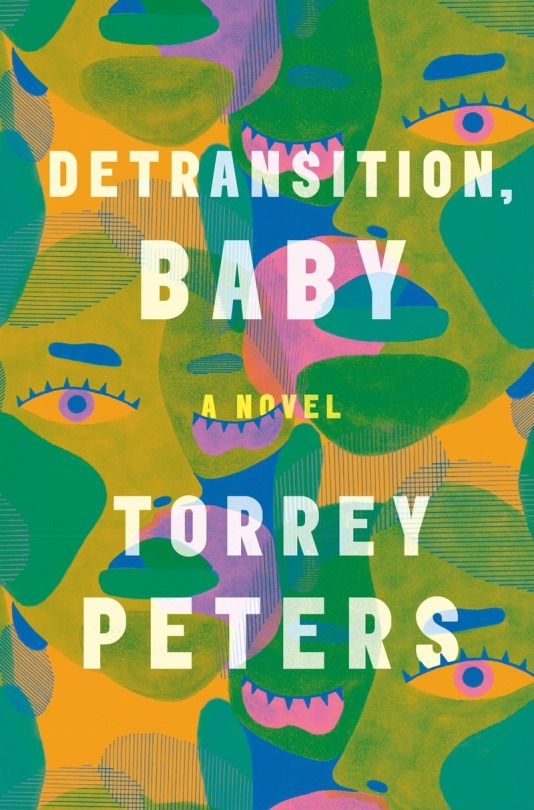
Detransition, Baby by Torrey Peters is an amazing novel.
You might think that it being one of the first novels by a trans writer to be published by a major, mainstream publisher would mean it’s a safe and sanitized depiction of being transfeminine. But that’s not the case.
Even if the premise is soap-operatic and may sound like the set-up to a silly comedy, albeit one dealing with provocative and heady themes. It's set in contemporary New York. Ames is a detransitioned trans woman, who now lives as a man. Ames has an affair with Katrina, his manager at work and a recently divorced woman. Katrina gets pregnant, but Ames is not fully comfortable with assuming the masculine role of a father. So he contacts Reese, a trans woman who he had a years-long relationship with when he lived as Amy, but which fell apart. Reese really wants to be a mother, and Ames wants her to be another parent to Katrina’s and Ames’s child. It will create a queer family structure where Ames can feel more comfortable.
It’s a ridiculous premise, both Reese and Katrina calls Ames a psychopath/sociopath for suggesting this. But they eventually agree to try it. And there is plenty of humour in the book, it’s a comedy in many ways.
Still this is an emotionally affecting novel that deals with serious themes. It tells the story of these three women’s highly unusual attempt to build a family, with flashbacks to Amy’s and Reese’s past as it also tells the story of how their relationship formed and broke apart and Amy detransitioned into Ames.
It’s so emotionally affecting because it dares to deal with trans people who are not perfect. They are not perfect feminist warriors for social justice, as inhuman in their perfectness as any idealized portrait of a saint. That might be what many readers, including many queers wants out of their media involving queer people. Escapism into a world where they don’t have to confront human flaws in their fiction.
The two trans main characters in Detransition, Baby are instead very messyand flawed people. They don’t do trans womanhood right at all. Especially Amy/Ames who is a detransitioner, perhaps the ultimate failure for a trans person.
Reese remains resolute in living as a woman, but she is a messy disaster queer. She deals with tons of internalized transmisogyny, which manifests in destructive relationships with terrible chaser men. She hides her faults behind a shell of a self-assured, witty, provocative and catty personality. But Reese also wants to be a mother, she wants a child to call her own.
All these faults, this messyness in their personalities is what makes them so relatable, so human. I don’t want to go into detail with how I related to Amy and Reese, because I feel that would reveal too many of my vulnerabilities to the world. But the book is able to talk about the realities of being a woman and being trans, because its characters are not perfect.
This book caused a controversy that centered around the depiction of Reese’s internalized transmisogyny, which she expresses in intentionally provocative ways. Of course, it was a transmisogynistic hate campaign from the start, started by Terfs and other transphobes, that used quotes from the book out of context to condemn Peters as a misogynist. The idea that Reese is not just a vehicle for the author’s opinions, that her abusive relationships with men are not some authorial ideal even if she deliberately seeks them out, seem to have never occurred to them.
The treatment of the theme in the book itself is much more interesting. It talks about how living in a patriarchy shapes women’s psyches, both cis and trans, how it defines their very identities. Women define themselves by their oppression by men in the patriarchy, the pain and the abuse. That is true even for feminists, for whom women’s victimhood under the patriarchy is their defining characteristic. “Hear women define themselves through pain, or rage against the assumption that they do, which still places pain front and center”.
And patriarchy also shapes our desires. Trans women are often accused of fetishising misogyny, but cis women do it as well. Many women have masochistic desires in their relationships with men, desires that are definitely connected to being raised in our patriarchal society It’s something that cis women writers, explicitly feminist or not have written about for ages. One of the most provocative statements in the book of how patriarchy and internalized misogyny shapes women’s desires, is “Every Woman adores a fascist”. I’ve seen it dragged out as proof of how much of a misogynist Peters is. But the sentence in italics in the book because it’s actually a famous quote from cis woman poet Sylvia Plath. It’s from her poem Daddy:”Every woman adores a Fascist,/The boot in the face, the brute/ Brute heart of a brute like you.”
Peters’s novel continues this difficult depiction of how women’s identity and desires are shaped by patriarchy that earlier writers like Plath had explored. And it has no easy answers to this. It made me think really hard about these things, which is what good fiction should do. If our desires are shaped by internalized misogyny, it doesn’t make those desires non-valid. For of course there is no noble savage nature hidden in our mind beneath the layers of being socialized in a patriarchal society.
But Peters has gotten so much criticism for her novel doing this, because she is a trans woman, and trans women are not allowed to have any internalized misogyny. That is a privilege reserved for cis women. We trans woman are expected even by our supposed allies to be perfect feminist role models, or else illegitimate. Our slightest failure in this regard is regarded as proof of our being misogynist men. The novel actually talks about this. The passage predicted and refuted the hate campaign against the book and Peters before it happened.
“..liberal feminists - especially the transhating variety - would have a field day with her. She supposed that they would accuse her of misogyny, of being a secret man, a Trojan horse in slutty lingerie who sought to recapitulate under the guise of womanhood all the abusive tropes that they, in the second wave, had sought to put in the past. But you know what? She didn’t make the rules of womanhood; like any other girl, she had inherited them. Why should the burden be on her to uphold impeccable feminist politics that barely served her?”
Reese is a depiction of a woman wanting to live up to some unattainable and unhealthy ideals of femininity. Her most tender desire is one that is pretty much impossible for a trans woman: she wants to be a mother. Her hope of fulfilling that in the weird and queer family structure that Ames tries to build is part of what gives the silly premise an emotional charge. Reese is a controversial and disagreeable character, and therefore so interesting and relatable.
The story of Amy/Ames depicts a subject that we trans people are touchy about: detransition. That’s because it’s so often used against us. But it’s a thing that trans people sometimes do, trans people doing it is actually much more common than the mistaken cis people narrative pushed by the transphobic media.
Amy’s story touches upon so much of the trans experience. She is a trans lesbian woman, and the book discusses how internalized transmisogyny and lesbophobia affects non-straight trans women. How they are stigmatized via concepts such as autogynephillia as perverted fetishists, and how they internalize this negative image.
Her character also depicts how us trans people often experience dissociation living as our assigned gender at birth. Living as a man, Amy experiences a kind of dissociation from her feelings and her body. It’s such a common thing for trans people to experience, as we can’t truly identify with our AGAB persona that we are living as.
It’s something that I experienced prior to transitioning, my own life, body and emotions felt distant to me, compared to my elaborate fantasy life and escapism through fictional media. That’s actually the one thing in this book I’m going to directly say related to my own feelings, because it’s something I’m pretty much over with my transition. In fact reading this book made me realize the extent of my own prior dissociation.
This dissociation from one’s own feelings can however also be comfortable. Feeling emotions directly is hard when they are difficult, and even joy can be difficult to process. And for Amy it becomes too much. A traumatic experience breaks her. She experiences violence from a transphobic cis man as her relationship with Reese falls apart. She dons the armour against her emotions that is masculinity, escapes her own feelings into maleness and detransitions. She starts living as Ames.
Detransition is something that trans people do. It’s driven by external pressures from living in a transphobic society most of the time. Living as a trans person, as a trans woman is made so difficult. It means living life as a freak, rejected by most people. Going back into repression is made so tempting. A detransition doesn’t mean that the person was never trans, or weak. It’s just that overwhelming forces are against trans people living their lives to the point that we sadly choose not to live them, either by suicide or detransition.
Amy/Ames’s emotional dissociation as a man shows how a trans person could live such a life. The emotional armour of cis masculinity can feel safe and comfortable compared to the emotional vulnerability of being a trans woman. It’s why it can take a long time to realize you are trans.
There is nothing simple about the novels depiction of these women’s lives, especially no easy answers. Accordingly the novel ends on an ambiguous note, with no resolution if the queer family of these three women will really work out.
Detransition, Baby is truly a masterpiece. It might be one of my favourite books. It’s such a well-written character study. It made me think in new ways about both myself and wider societal issues. That’s the highest praise I can give a book. There is something refreshing about a novel that dares to depict the struggles of being transfeminine with such honesty and humour. That dares to be ambiguous and give no simple answers. It shows imperfect and messy transfeminine lives, where we struggle with more than just the acceptable struggles of external transphobia and dysphoria. I seldom related to the characters and story of a novel so much, in ways that I can’t comfortably explain.
It’s more honesty than most TME people can take, dealing with difficult questions about being a woman and about being trans. Anyone who only wants art to be comfortably simple and escapist will be turned off. It’s not an obscurantist book, but the transfeminine perspective is so unwanted that it will be easily wilfully misunderstood by TME people. I’m happy this book made it into the mainstream and managed to get published by Penguin Random House. But that has gotten it attention from people that don’t have the capacity to understand it, and doesn’t want to. This is the cause of the transmisogynist campaign against this book that aims to destroy Torrey Peters’s writing career. The cis can’t accept a trans woman author. Yet I hope that Peters will keep on writing, we need her perspective so badly.
#detransition baby#torrey peters#my writings#cw for discussions of transmisogyny#seriously read this book#i spoiled it basically but this book made me think so much#and feel so deeply
40 notes
·
View notes
Text
Ni-doms: Being "right" all the time
Another rant after a while.
INTRO: Discretion is Advised; Context is given
I am done with people blaming it on Ni as a cognitive function as to why they THINK they are right all the time. I studied and wrote about autonomy in Philosophy of Ethics AND Biomedical/Research Ethics so let me do people a favor and connect MBTI and said topics.
Disclaimer: I am not a licensed professional nor do I have a finished degree; education is really expensive. But degrees and licenses does not and should never hinder us from reaching a truth, a conclusion, and an idea that is worth considering and sharing. Then again, take this with just a DASH of salt for I already sound salty as an Ni dom.
Cognitive functions: Aren't to JUSTIFY BEHAVIOR
My argument for this title is threefold:
Cognitive is at the SIMPLEST sense only how someone thinks, their temperments how they prefer and tend to behave.
Behavior has an important variable that provides distinction between cognitive which is: CHOICE. Cognitive is both conscious and unconscious; you have a choice to let your THOUGHTS and PREFERENCES affect your behavior but also the opposite.
Therefore, a thing that isn't ALWAYS of your own VOLITION can NEVER justify behavior which is something DEPENDENT on said VOLITION.
Here's examples of each point to make it clear:
Cognitive function stack of Ni-doms let's say INFJs can make them sound crazy for seemingly jumping into a conclusion with no real world basis.
"make them sound crazy" is how a lot of us including me (an INTJ) would describe people talking about something without tangible proof. This description was a CHOICE I did. I SPOKE it. I had a choice not to say it that way, or keep my mouth shut. But I DID IT ANYWAY. This is behavior.
Justifying behavior can be pictured as "oh because he's sick, so he had to do it that way." or "she's always been like that, we just have to deal with it."
Before any objections let me DEFINE things to ensure we are on the same page:
Justifying Behavior: is an act to validate why a certain behavior is reasonable
Volition: it is upon the individuals will and choice
Unconscious: it is always running no matter what; individual may be unaware of it (breathing is unconscious)
Conscious: an individual is aware of something being done or they are doing (counting your breaths is conscious)
Temperments: i used this similar to how it WAS historically introduced aka Galen's 4 temperments) PART of a person thus it is INNATE NOT DEVELOPED because temperments is their NATURE that TENDS to dictate how they behave
Innate: something you got from the beginning, not something you grow (if you have arms, you got that from the start unless you grew your arm)
Objections to my argument
"You explaining this is an act of justification"
Good job. You are right. I am justifying something. Said something is my point of something of my OWN VOLITION i.e. this whole post should not be JUSTIFIED by using my type. I am not mansplaining everything because I want people to discover an answer for themselves. But MY POINT is this whole post had a CHOICE opposite to it, which was to not post. And that choice of posting it anyway is what makes behavior a reasonable recepient of scrutiny, criticism. So good on you for trying.
"Ni-doms always act like they ARE right all the time"
I am not trying to justify INFJs and INTJs acting that way. I am telling you that blaming it on them being Ni-doms is GREATLY misrepresenting MBTI and also backwards on how psychology SHOULD be. Psychology used to be a part of Philosophy and it was to make sense of people. But because of modernity it became a part of medicine but I am in a school of thought that IF psychology is a part of medicine then it would only be just to relate it with their usual saying of: "Prevention is better than cure." Sure this is being done in the slowest way possible because mental health is hard to disassociate with pre-existing cultures but the fact people "psycho-analyze" and DESCRIBE behavior with a NAME like "Oh it's her trauma acting up" "Oh she has social anxiety" is horrid practice of "understanding people." Stopping at descriptions bring prejudice, stereotypes, and a lot more horrid things.
"Why define and restrict your terms? Is it to lessen objections?"
No. Human reason is SO imperfect and incomplete that every reasonable reason has an EQUALLY reasonable contradiction. So objections are inevitable but MISUNDERSTANDINGS are avoidable.
FINAL THOUGHTS: Summaries and Callbacks
MBTI can never justify and make you know a person. MBTI cannot help YOU READ OTHERS better. Sure, you can find ways for it to but that defeats the point. MBTI is to UNDERSTAND. Not JUSTIFY in a way that stops at DESCRIPTIONS. Not KNOW in a way that leads to shorthanded prejudices towards someone. Not even to UNDERSTAND OTHERS but mainly and solely to UNDERSTAND YOURSELF so you can learn how to be MORE THAN INFJ or INTJ. MORE than your TEMPERMENTS. MORE than your NATURE. BECAUSE YOU ARE GIVEN A CHOICE TO GO AGAINST IT.
I'll try to edit this for proper formatting and may or may not write more about the different functions but I highly suggest doing your own research, reach your own truth. It is easier to confide with a truth we discover rather than something spoonfed to us.
2 notes
·
View notes
Note
9 (in my defense i'm a social scientist ajdjfjfkfj), 18 and 27 for the character development ask game!
I'll take Zel for this one because I really don't talk about her enough. I'm also going to do these out of order because I went on a whole adventure for number 9, the question about socioeconomic status.
Is your character more likely to admire wisdom, or ambition in others?
Wisdom is what she most actively admires, because she wants to be capable and collected and not chaotic, and to avoid more pitfalls of being ambitious. Once upon a time she had ambitious academic and career goals: when she started college in Takolem City, she wanted to be a veterinarian. She made it about a year and a half in her veterinary science program before various factors led to her transferring to a school in Winchester and finishing out a degree in literature, and she has a lot of regrets about how that went. She's also just plain envious of her brother, who somehow managed to get all the way through a doctoral degree and then land an extremely cool space job almost by accident?? Rude???
How does your character normally deal with confrontation?
It really depends on the context and who's involved. In public, or with people she doesn't know well, she tries to defuse things with humor and sarcasm, often @ herself. But in private, especially with people she knows well, and especially her brother, she accelerates pretty quickly from defusing with sarcasm to full-on shouting match. Except it's not really a "match" with Zalen because it takes a lot to make him yell at anyone. She's never shouted at Anni, but Anni also doesn't really confront people that much.
Is your character’s current socioeconomic status different than it was when they were growing up?
I possibly thought about this way too hard and went kind of sideways, but I think I understand socioeconomic status better as a concept? If I say anything that makes you go ?? feel free to reply/message me/send another ask.
Anyway, the short answer is yeah, mostly. Zel grew up in a tiny rural mountain town in Takolem. Goods that had to be brought in from elsewhere—even up from the foothills—tended to be more expensive, but the town and its nearby neighbors could produce most of the basics themselves (food, water, soap, furniture, etc.) and the community tended to be pretty cohesive and supportive of mutual aid. Universal basic income was provided to adults by Takolem's government, but it was scaled by average costs for basic requirements of living. Those requirements were defined broadly, but still, for Zel's hometown, the payouts were some of the lowest in the country, even as prices for external goods rose in tandem with costs of living in other areas. Zel's grandfather had a decent job that shored up the UBI payouts to support a four-person household, but a lot of the tech that Zel owns now would have been luxuries during her childhood.
Zel now lives in a major city in Deridis, where UBI payouts are generally higher, even if the exact details of why are different for Deridis's goverment. She could coast on UBI for a while since she's only supporting herself in a small apartment. But it's nice to have the extra money (and tax write-offs for some of her tech) and she likes streaming. So that's kind of the economic part. The socio- part of the question is more complex. (To be clear, I'm looking at this from a US perspective because that's what I know.) I haven't thought a lot about how it's conceptualized in-world, but in both of these contexts blue collar jobs and trades are actually valued, and more even income and wealth distribution means that there isn't a stark division between "haves" and "have-nots" in terms of numbers or social standing (I know making use of resources like tutoring or extracurricular activities is more complicated than just how much time and money people have available to them, but on those basic levels there's more equality). Zel does sometimes struggle with no longer living in the same community as she did growing up, because she doesn't have the benefits of directly knowing people and being able to learn from them. She still hasn't really succeeded in building up a new community around herself that she can rely on and contribute to. There's also an element of how different species' cultures influence one another. Zel's home culture was mostly in conversation with local tree and mushroom person cultures, whereas Deridis has a strong relationship with orea-nawwen cultures, which does change some of the underlying attitudes and species distribution across different types of jobs. So overall Zel has a higher socioeconomic status now than when she was a kid, but it's complicated especially when you look at it in terms of social class.
#Zel and Zalen do actually like each other. There are just a lot of difficult feelings there#ask games#hard mode ask game#rose brambles#c: Zel#wip: tfa
2 notes
·
View notes
Note
11 and 18 for the ask game
Context.
11. What does switching feel like to you, if you switch at all?
Well, this one is way more perplexing than it used to be, because we used to just have one singular way we would switch, where everyone would have a slow kind of changing where we were one person, and the we were some other person in the next fuve minutes...or similar.
Now it seems to have variations within the polyplex, with the additional fun of it being completely random (seemingly) on who switches in what way.
They all take time, but we've had people that just push to front by giving us all headaches in the morning (unintentionally so). We have people who just slide in gently and pick another fronter up like a wet kitten before plopping them in the ground (Shado is...extremely guilty of this one when it comes to some folks, and it seems surprising until you realize it's not). Most of us still have this slow-changing minor paradigm shift. We have people who tag themselves out. We also have situations where people act as how most systems define "gatekeepers" to the front — but for us it seems this is more because if someone has asked to front, and can't make it before the previous fronter leaves, welp, someone needs to take the body for a bit, right?
It is rare but sometimes Diluc/Silva can take executive control of front in situations that require specific types of action and quick thinking. It seems that Raymond also does this or can do this, but I am not certain most of us have witness it (as compared to Silva/Diluc, who is well-known in the system for having protected us during our years at [REDACTED] awhile back). Raymond tends to be more in the category of an analytical thinker rather than someone who will just do things, so I am rather interested to see the situations that may have arisen for this to happen.
(Although I hope the day never comes either.)
18. Are there differences between systemmates surrounding sensory things? (For example, one person likes the taste of one food and another doesn’t.)
Oh yes, there are absolutely variations in this. This used to be how everyone discerned who was fronting, that was before it stopped working; there is a point in time where more context clues than simply sensory queues must be taken into account, no?
We even have differences down to the sensory toys we stim with during work shifts, if the call load permits it. Some of us like them closer to the computer and some of us prefer the pineapple over the, uh, bubble square (I do not have the word for it).

[A squishy pineapple with sunglasses sits on top of a tricolor silicon square. The square fake popping bubbles embedded in it that are meant to be pushed. Both of these sit on a worn, white "desk" that is more of a refurbished old dresser.]
We used to have this even squishier cake stress "ball" but we actually used it so much the item got halved into pieces. Over and over, until we just had to throw the whole thing away, bit by bit. If I ever fund out where it came from, I'm definitely getting another one.
We also have differences in taste (we mean this as literally as much as we do our taste in food), sight, and hearing (this one is...not as obvious? In general the body is sensitive to sounds that are not caused or controlled by us specifically). We just don't bother with those as much since changing those as often as we do fronters would mean nothing would get done (if we even survived long enough to initiate a task, in a neutral way. I'm speaking practically here).
I hope this is a detailed enough answer? This was enjoyable and I hope others send in asks.
- 👁
2 notes
·
View notes
Note
Have you seen / played The Last of us II. If yes, what do you think? Personally, I don't like Abby, and especially her relationship with Yev, which is so forced that it's borderline absurd. I hope they will develop this part more in the adaptation. Because, it's fucking stupid that Abby suddenly decides that Yev becomes everything to her, in just two / three fucking days. Clearly, it was just a reminder of the Joel & Ellie relationship, but it just sucked.
I did see Part II, but I barely remember how she actually bonded with Yev. I'm planning on rewatching. Can't answer for that.
However, I remember liking the overall story while still missing Joel. I like how how it continues from Ellie's struggle to forgive Joel for essentially putting himself above the world and denying her wish while still loving him. Also how we lean more into the dark side or risk of love and it's loss: revenge.
In a dystopia (defined as "an imagined state or society in which there is great suffering or injustice, typically one that is totalitarian or post-apocalyptic" OR "a society characterized by human misery, as squalor, oppression, disease, and overcrowding"), people will form strong bonds and find some sort of hope in each other, biologically connected or not. It is what makes them the same and safe. Revenge is maybe inevitable in a context like this, even for Ellie.
Ellie is an example of a person who also has bigger hopes of ending human suffering though partially because she lost so many people to the fungus and the former society's dissolution, while Joel's interests conflict with hers as he simply wishes to survive with those he loves around him. They see each other as parent-child, but she would have (and does) have so much resentment and rage because her hopes were dashed, her desire to fulfill what she thought was her purpose has now gone to the way side and she felt she would never have another opportunity like that again. And she feels that Joel betrayed her trust when she has trusted in him, him knowing that she would have wanted to risk herself for this cure that she knows could come to nothing whether due to human stupidity, miscalculation, or ineffectuveness.
To have her lose Joel before she could really come to terms with that and reconcile, Joel is taken from her. And perhaps she feels she has to make up for "abandoning" him, reconnect in a twisted way, as well as give herself a new purpose through revenge for his person who raised and protected her. But even in my words, it shows that it's both about Joel and not about Joel -- purpose.
And one scenario where that love for someone conflicting with the "love" for humanity ends up destroying the regard for oneself, blinding them into abandoning themselves and others in a perpetual cycle that can only be stopped by an active choice.
IDK, I liked the twists. I and thought that it was actually very natural for the story to go the way it did. Again, did I miss Joel? Of course! I believe that that is kinda the point of his early death in the game. He hangs over us and Ellie like a lead shadow, her memory and grief urging and pressing her to travel outside of the place where Joel took her to keep her safe and have her develop something like a "normal" life. She made the choice to leave that life, that safe haven to right a wrong, when she hadn't ever confronted the first wrong, which can never truly be confronted because Joel is dead! Crazy writing, loved it.
We at first root for her because we liked Joel and how he died was brutal...and then we come up against the fact that his death was also a revenge killing?! A woman avenging her father, using the rationale of how her father was more "important" than Ellie because he was getting a cure? Abby, with her own hypocrisies that mirror Ellie's and Joel's, when we all know the tri reason she killed Joel was for her father, as the show's Kathleen pursued Henry and Sam? What?!
2 notes
·
View notes